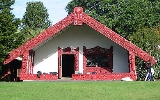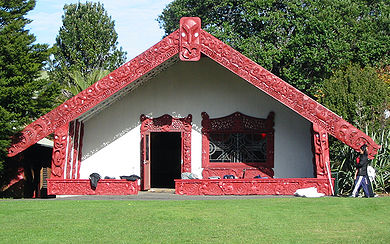
Whare whakairo
Encyclopedia

New Zealand
New Zealand is an island country in the south-western Pacific Ocean comprising two main landmasses and numerous smaller islands. The country is situated some east of Australia across the Tasman Sea, and roughly south of the Pacific island nations of New Caledonia, Fiji, and Tonga...
, generally situated as the focal point of a marae
Marae
A marae malae , malae , is a communal or sacred place which serves religious and social purposes in Polynesian societies...
. Wharenui are usually called 'meeting houses' in New Zealand English
New Zealand English
New Zealand English is the dialect of the English language used in New Zealand.The English language was established in New Zealand by colonists during the 19th century. It is one of "the newest native-speaker variet[ies] of the English language in existence, a variety which has developed and...
.
Wharenui
Also called a whare rūnanga ("meeting house") or whare whakairo (literally "carved house"), the present style of wharenui originated in the early to middle nineteenth century. The houses are often carved inside and out with stylized images of the iwiIwi
In New Zealand society, iwi form the largest everyday social units in Māori culture. The word iwi means "'peoples' or 'nations'. In "the work of European writers which treat iwi and hapū as parts of a hierarchical structure", it has been used to mean "tribe" , or confederation of tribes,...
's (or tribe's) ancestors, with the style used for the carvings varying from tribe to tribe. Modern meeting houses are built to regular building standards. Photographs of recent ancestors may be used as well as carvings. The houses always have names, sometimes the name of a famous ancestor or sometimes a figure from Māori mythology. Some meeting houses are built where many Māori are present, even though it is not the location of a tribe; typically, a college or school with many Māori students. While a meeting house is considered sacred, it is not a church or house of worship, but religious rituals may take place in front of or inside a meeting house. On most marae, no food may be taken into the meeting house.
A Meeting House
Meeting houses are the center of any cultural, business, or any affair which is relevant to the iwi as a whole.- Typically, visitors to the village would be allowed to stay in the meeting house at night.
- Ceremonial occasions, including wedding and funeral typically take place in the meeting house or on the marae āteaMaraeA marae malae , malae , is a communal or sacred place which serves religious and social purposes in Polynesian societies...
in front of the house. - Strict rules of conduct generally govern the use of the wharenui, which is considered the domain of unity and peace. If anyone should become irate or physically violent, they would be asked to leave the house until they can control their temper.
External links
- This picture is the opening of Te Wheke Hall on December 30, 1901.
- The Field Museum of Natural History in Chicago, Illinois has an original Māori meeting house, called Ruatepupuke II as shown in this photo.
- The British Museum has a large collection of Māori art.

